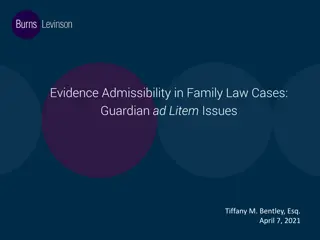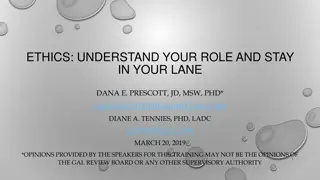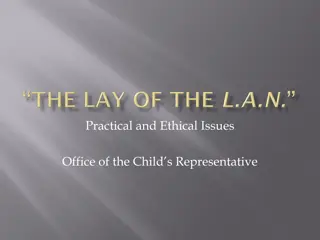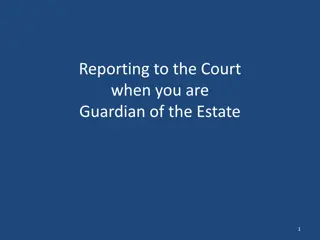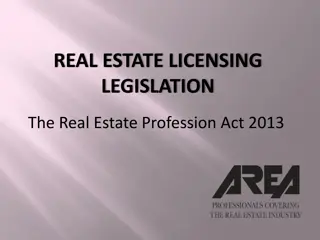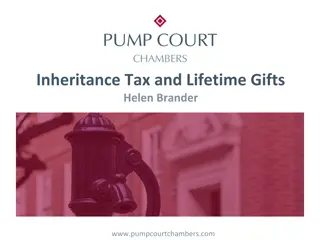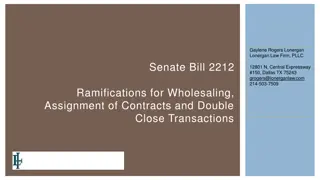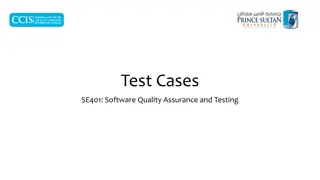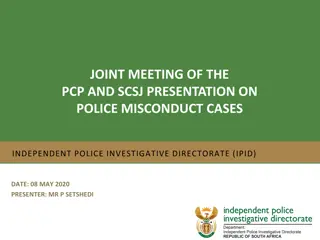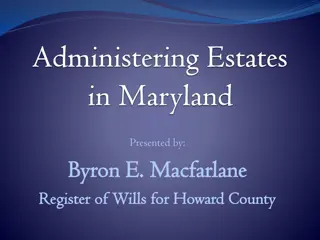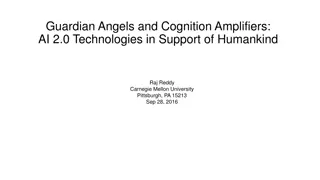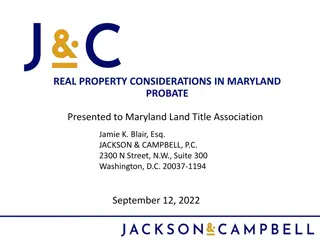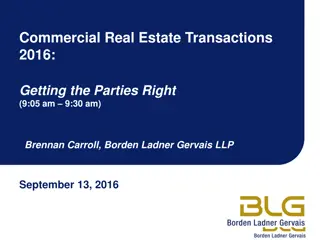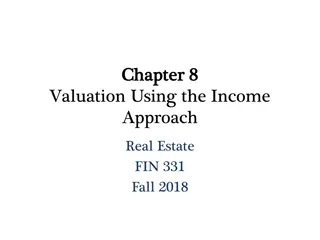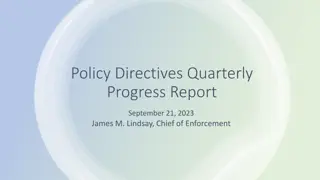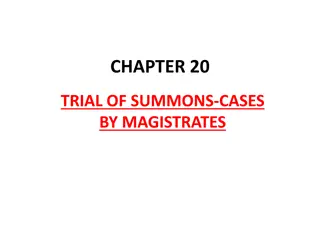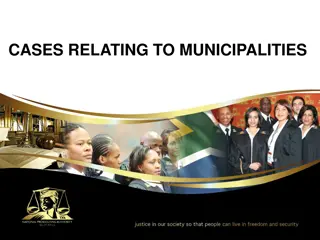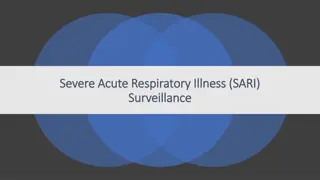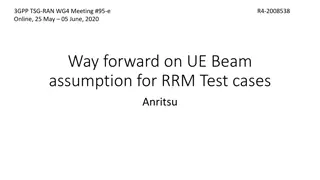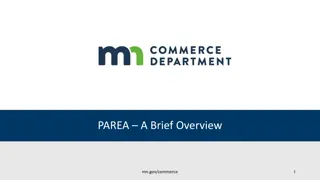Understanding the Role of Guardian ad Litem in Estate Planning Cases
A Guardian ad Litem (GAL) is appointed by the court to represent the best interests of incapacitated individuals or minors in legal cases. In Washington State, a GAL is distinct from a certified professional guardian. The responsibilities, appointment criteria, and duties of a GAL, including assessing risks of harm and ensuring proper care, are outlined in relevant statutes. The determination of incapacity is a legal decision based on demonstrated management deficiencies over time. GALs must meet eligibility requirements, undergo background checks, and fulfill their obligations in accordance with the law.
Download Presentation

Please find below an Image/Link to download the presentation.
The content on the website is provided AS IS for your information and personal use only. It may not be sold, licensed, or shared on other websites without obtaining consent from the author. Download presentation by click this link. If you encounter any issues during the download, it is possible that the publisher has removed the file from their server.
E N D
Presentation Transcript
January 2019 SPOKANE ESTATE PLANNING COUNCIL guardian ad litem considerations Lisa A. Malpass https://winstoncashatt.com/images/email-sig-kelly.gif Bank of America Building 601 West Riverside, Suite 1900 Spokane, Washington 99201 Phone: 509.838-6131 Email: lam@winstoncashatt.com www.winstoncashatt.com
What is a Guardian ad Litem? Related terms: AD LITEM, AGENT AD LITEM, GUARDIAN ACCOUNT, GUARDIAN DEED, GUARDIAN, TESTAMENTARY GUARDIAN, IN LITEM, CURATOR AD LITEM, LITEM DENUNCIARE, OATH IN LITEM By legal definition, a guardian ad litem is the party the court deems responsible for an incapacitated, handicapped, or minor in court. In Washington State, A guardian ad litem (GAL) is an individual appointed by the court to represent the best interests of a child or incapacitated person involved in a case in superior court. GAL is different from a certified professional guardian (CPG) or a lay guardian. A CPG is an individual or agency who serves as the legal guardian of at least three individuals and provides this service as a profession.
RCW 11.88 Guardianship for Adults and Minors The superior court of each county shall have power to appoint guardians for the persons and/or estates of incapacitated persons,and guardians for the estates of nonresidents of the state who have property in the county needing care and attention. a person may be deemed incapacitated as to: PERSON when the superior court determines the individual has a significant risk of personal harm based upon a demonstrated inability to adequately provide for nutrition, health, housing, or physical safety. ESTATE when the superior court determines the individual is at significant risk of financial harm based upon a demonstrated inability to adequately manage property or financial affairs. A determination of incapacity is a legal not a medical decision, based upon a demonstration of management insufficiencies over time in the area of person or estate. Age, eccentricity, poverty, or medical diagnosis alone shall not be sufficient to justify a finding of incapacity. A person may also be determined incapacitated if he or she is under the age of majority as defined in RCW 26.28.010. For purposes of giving informed consent for health care pursuant to RCW 7.70.050 and 7.70.065, an "incompetent" person is any person who is (i) incompetent by reason of mental illness, developmental disability, senility, habitual drunkenness, excessive use of drugs, or other mental incapacity, of either managing his or her property or caring for himself or herself, or both, or (ii) incapacitated as defined in (a), (b), or (d) of this subsection. For purposes of the terms "incompetent," "disabled," or "not legally competent," as those terms are used in the Revised Code of Washington to apply to persons incapacitated under this chapter, those terms shall be interpreted to mean "incapacitated" persons for purposes of this chapter.
RCW 11.88 Guardian ad Litem Is there a significant risk of personal or financial harm and demonstrated inability to adequately provide for his or her self? Must maintain eligibility for Superior Court Registry of 11.88 guardian ad litems, including a criminal background check. Duties described in statute and can be expanded. Responsible to notify court of need for counsel / appointment of counsel Makes recommendation to court on rights of alleged incapacitated person, including but not limited to, the right of the alleged incapacitated person to revoke or write a will, marry, divorce, vote, contract, lease, sell or buy property. Ability for a client to draft or change estate planning documents. The right to dispose of one s property by will is a valuable right that one can only exercise with testamentary capacity. Dean v. Jordan, 194 Wash. 661, 668 (1938). A guardian appointment does not conclusively establish a lack of capacity on the ward s part to execute a will. In re Estate of Bottger, 14 Wn. 2d 676, 697 (1942). In re Estate of Alsup (2014)
Guardianship Estate Planning for Minors and Adults Drafting considerations RCW 11.88.080 - Guardians nominated by will or durable power of attorney. When either parent is deceased, the surviving parent of any minor child or a sole parent of a minor child, may by last will or durable power of attorney nominate a guardian or guardians of the person, or of the estate or both, of a minor child, whether born at the time of executing the instrument or afterwards, to continue during the minority of such child or for any less time. This nomination shall be effective in the event of the death or incapacity of such parent. Every guardian of the estate of a child shall give bond in like manner and with like conditions as required by RCW 11.88.100 and 11.88.110, and he or she shall have the same powers and perform the same duties with regard to the person and estate of the minor as a guardian appointed under this chapter. (guardian by proxy) The court shall confirm the parent's nomination unless the court finds, based upon evidence presented at a hearing on the matter, that the individual nominated in the surviving parent's will or durable power of attorney is not qualified to serve. In the event of a conflict between the provisions of a will nominating a testamentary guardian under the authority of this section and the nomination of a guardian under RCW 11.125.410, the most recent designation shall control. This section applies to actions commenced under RCW 11.125.160. (i.e., DPOA Court Petition)
RCW: 11.76 SETTLEMENT OF ESTATES If there be any alleged incapacitated person as defined in RCW 11.88.010 interested in the estate who has no legally appointed guardian or limited guardian, the court: (1) At any stage of the proceeding in its discretion and for such purpose or purposes as it shall indicate, may appoint; and For hearings held under RCW 11.54.010 (family support allowance), 11.68.041 (petition for nonintervention estate), 11.68.100 (closing of estate) , and 11.76.050 (hearing on final report) or for entry of an order adjudicating testacy or intestacy and heirship when no personal representative is appointed to administer the estate of the decedent, shall appoint some disinterested person as guardian ad litem to represent the allegedly incapacitated person with reference to any petition, proceeding report, or adjudication of testacy or intestacy without the appointment of a personal representative to administer the estate of decedent in which the alleged incapacitated person may have an interest, who, on behalf of the alleged incapacitated person, may contest the same as any other person interested might contest it, and who shall be allowed by the court reasonable compensation for his or her services: PROVIDED, HOWEVER, That where a surviving spouse or surviving domestic partner is the sole beneficiary under the terms of a will, the court may grant a motion by the personal representative to waive the appointment of a guardian ad litem for a person who is the minor child of the surviving spouse or surviving domestic partner and the decedent and who is incapacitated solely for the reason of his or her being under eighteen years of age.
RCW 11.96A TRUST ESTATE DISPUTE RESOLUTION ACT (TEDRA) RCW 11.96A.160 Appointment of guardian ad litem. (1) The court, upon its own motion or upon request of one or more of the parties, at any stage of a judicial proceeding or at any time in a nonjudicial resolution procedure, may appoint a guardian ad litem to represent the interests of a minor, incapacitated, unborn, or unascertained person, person whose identity or address is unknown, or a designated class of persons who are not ascertained or are not in being. If not precluded by a conflict of interest, a guardian ad litem may be appointed to represent several persons or interests. (2) The court-appointed guardian ad litem supersedes the special representative if so provided in the court order. (3) The court may appoint the guardian ad litem at an ex parte hearing, or the court may order a hearing as provided in RCW 11.96A.090 with notice as provided in this section and RCW 11.96A.110. (4) The guardian ad litem is entitled to reasonable compensation for services. Such compensation is to be paid from the principal of the estate or trust whose beneficiaries are represented.
Revised Code of Washington 4.08 Can a litigant understand the legal significance of legal proceedings and the effect of such proceedings on the litigant s best interests? The trial court has inherent power to appoint a guardian ad litem for a litigant in a civil matter upon a finding that the litigant is incompetent. RCW 4.08.060 When counsel is unable to communicate with the lawyer and the litigant is not competent to represent his/her own interests pro se. Guardian ad litem to review the record and determine the level of participation, understanding of the litigant, settlement, and best interests. Unlike the guardianship statute (RCW 11.88) a GAL is appointed when the issue of a party s competence to understand the legal proceedings is raised and the trial court makes a determination, when it is reasonably convinced, a party is competent or, if not, requires a GAL. See Vo v. Pham, 81 Wash.App. 781, 784, 916 P.2d 462 (1996); Graham v. Graham, 40 Wash.2d 64, 240 P.2d 564 (1952) RPC 1.14
CONCLUSION Questions and suggested Answers


